Premium Only Content
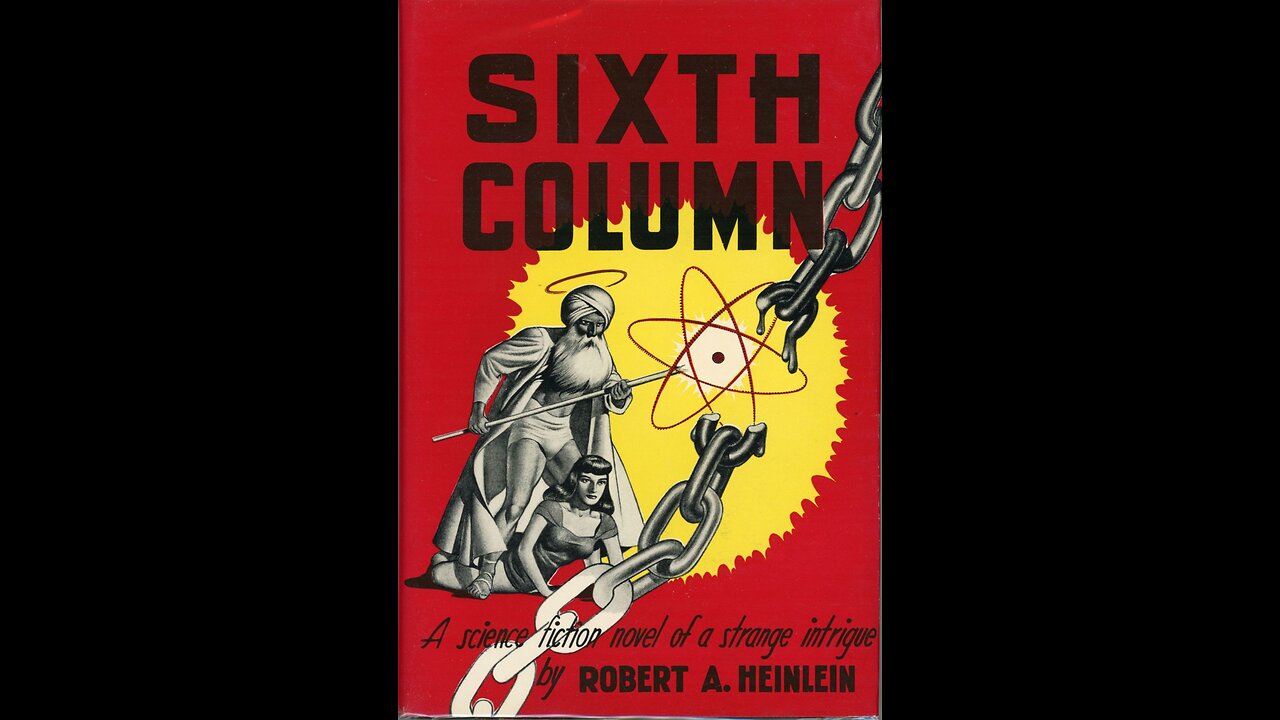
SIXTH COLUMN. By Robert A. Heinlein. A Puke (TM) Audiobook
A NATIONAL SURVEY.
He gradually built up a picture of a people being systematically and thoroughly enslaved, a picture of a nation as helpless as a man completely paralyzed, its defenses destroyed, its communications entirely in the hands of the invaders.
Everywhere he found boiling resentment, a fierce willingness to fight against the tyranny, but it was undirected, uncoordinated, and, in any modern sense, unarmed. Sporadic rebellion was as futile as the scurrying of ants whose hill has been violated. Pan-Asians could be killed, yes, and there were men willing to shoot on sight, even in the face of the certainty of their own deaths. But their hands were bound by the greater certainty of brutal multiple retaliation against their own kind. As with the Jews in Germany before the final blackout in Europe, bravery was not enough, for one act of violence against the tyrants would be paid for by other men, women, and children at unspeakable compound interest.
SIXTH COLUMN.
This is a work of fiction. All the characters and events portrayed in this book are fictional, and any resemblance to real people or incidents is purely coincidental.
Copyright (c) 1949 by Robert A. Heinlein.
Reprinted from Astounding Science Fiction, (c) 1941 by Street and Smith Publications Inc.
All rights reserved, including the right to reproduce this book or portions thereof in any form.
A Baen Book Baen Publishing Enterprises PO. Box 1403 Riverdale, NY 10471
ISBN: 0-671-72026-0
Cover art by John Melo First Baen printing, January 1988 Fourth Baen printing, July 1995
Distributed by SIMON & SCHUSTER 1230 Avenue of the Americas New York, NY 10020
Printed in the United States of America For John S. Arvvine
CHAPTER ONE.
"What the hell goes on here?" Whitey Ardmore demanded.
They ignored his remark as they had ignored his arrival. The man at the television receiver said, "Shut up. We're listening," and turned up the volume.
The announcer's voice blared out: “Washington destroyed completely before the government could escape. With Manhattan in ruins, that leaves no,” there was a click as the receiver was turned off.
"That's that," said the man near it. "The United States is washed up." Then he added, "Anybody got a cigarette?"
Getting no answer, he pushed his way out of the small circle gathered around the receiver and felt through the pockets of a dozen figures collapsed by a table. It was not too easy, as rigor mortis had set in, but he finally located a half-empty pack, from which he removed a cigarette and lighted it.
"Somebody answer me!" commanded Ardmore. "What's happened here?"
The man with the cigarette looked him over for the first time. "Who are you?"
"Ardmore, major, intelligence. Who are you?"
"Calhoun, colonel in research."
"Very well, Colonel-I have an urgent message for your commanding officer. Will you please have someone tell him that I am here and see to it that I am taken to him?" He spoke with poorly controlled exasperation.
Calhoun shook his head. "Can't do it. He's dead." He seemed to derive some sort of twisted pleasure from the announcement.
"Huh?"
"That's right-dead. They're all dead, all the rest. You see before you, my dear Major, all that are left of the personnel of the Citadel-perhaps I should say of the emergency research laboratory, department of defense, this being in the nature of an official report." He smiled with half his face, while his eye took in the handful of living men in the room.
Ardmore took a moment to comprehend the statement, then inquired, "The Pan-Asians?"
"No, No, not the Pan-Asians. So far as I know, the enemy does not suspect the existence of the Citadel. No, we did it ourselves-an experiment that worked too well. Doctor Ledbetter was engaged in research in an attempt to discover a means of.”
"Never mind that, Colonel. Whom does command revert to? I've got to carry out my orders. "
"Command? Military command? Good Lord, man, we haven't had time to think about that yet. Wait a moment."
His eye roved around the room, counting noses. "Hum, I'm senior to everyone here-and they are all here. I suppose that makes me commanding officer."
"No line officers present?"
"No, all special commissions. That leaves me it. Go ahead with your report."
Ardmore looked about at the faces of the half a dozen men in the room.
They were following the conversation with apathetic interest. Ardmore worried to himself before replying over how to phrase the message. The situation had changed; perhaps he should not deliver it at all.
"I was ordered," he said, picking his words, "to inform your general that he was released from superior command. He was to operate independently and prosecute the war against the invader according to his own judgment.
You see," he went on, "when I left Washington twelve hours ago we knew they had us. This concentration of brain power in the Citadel was about the only remaining possible military asset."
Calhoun nodded. "I see. A defunct government sends orders to a defunct laboratory. Zero plus zero equals zero. It's all very funny if one only knew when to laugh."
"Colonel!"
"Yes?"
"They are your orders now. What do you propose to do with them?"
"Do with them? What the hell is there to do? Six men against four hundred million. I suppose," he added "to make everything nice and tidy for the military mind I should write out a discharge from the United States army for everybody left and kiss 'em good-by. I don't know where that leaves meharakiri, perhaps. Maybe you don't get it. This is all the United States there is left. And it's left because the Pan-Asians haven't found it."
Ardmore wet his lips. "Apparently I did not clearly convey the order. The order was to take charge, and prosecute the war!"
"With what?"
He measured Calhoun before answering. "It is not actually your responsibility. Under the changed situation, in accordance with the articles of war, as senior line officer present I am assuming command of this detachment of the United States army!"
It hung in the balance for twenty heartbeats. At last Calhoun stood up and attempted to square his stooped shoulders. "You are perfectly correct, sir. What are your orders?"
"What are your orders?" he asked himself. Think fast, Ardmore, you big Junk, you've shot off your face-now where are you? Calhoun was right when he asked "With what?” yet he could not stand still and see the remnant of military organization fall to pieces.
You've got to tell 'em something, and it's got to be good; at least good enough to hold 'em until you think of something better. Stall, brother, stall! "I think we had best examine the new situation here, first. Colonel, will you oblige me by having the remaining personnel gather around-say around that big table? That will be convenient."
"Certainly, sir." The others, having heard the order, moved toward the table. "Graham! And you, what's your name? Thomas, isn't it? You two remove Captain MacAllister's body to some other place. Put him in the corridor for now."
The commotion of getting one of the ubiquitous corpses out of the way and getting the living settled around a table broke the air of unreality and brought things into focus. Ardmore felt more self-confidence when he turned again to Calhoun. "You had better introduce me to those here present. I want to know what they do and something about them, as well as their names."
It was a corporal's guard, a forlorn remnant. He had expected to find, hidden here safely and secretly away under an unmarked spot in the Rocky Mountains, the most magnificent aggregation of research brains ever gathered together for one purpose. Even in the face of complete military disaster to the regular forces of the United States, there remained a reasonable outside chance that two hundred-odd keen scientific brains, secreted in a hide-away whose very existence was unsuspected by the enemy and equipped with every modern facility for research, might conceivably perfect and operate some weapon that would eventually drive out the Pan-Asians.
For that purpose he had been sent to tell the commanding general that he was on his own, no longer responsible to higher authority. But what could half a dozen men do in any case?
For it was a scant half a dozen. There was Doctor Lowell Calhoun, mathematician, jerked out of university life by the exigencies of war and called a colonel. There was Doctor Randall Brooks, biologist and bio-chemist, with a special commission of major. Ardmore liked his looks; he was quiet and mild, but gave the impression of an untroubled strength of character superior to that of a more extroverted man-he would do, and his advice would be useful.
Ardmore mentally dubbed Robert Wilkie a "punk kid." He was young and looked younger, having an overgrown collie-dog clumsiness, and hair that would not stay in place. His field, it developed, was radiation, and the attendant branches of physics too esoteric for a layman to understand.
Ardmore had not the slightest way of judging whether or not he was any good in his specialty. He might be a genius, but his appearance did not encourage the idea.
No other scientist remained. There were three enlisted men: Herman Scheer, technical sergeant. He had been a mechanic, a die maker, a tool maker. When the army picked him up he had been making precision instruments for the laboratories of the Edison Trust. His brown, square hands and lean fingers backed up his account of himself. His lined, set face and heavy jaw muscles made Ardmore judge him to be a good man to have at his back in a tight place. He would do.
There remained Edward Graham, private first-class, specialist rating officers' cook. Total war had turned him from his profession as an artist and interior decorator to his one other talent, cooking. Ardmore was unable to see how he could fit into the job, except, of course, that somebody had to cook.
The last man was Graham's helper, Jeff Thomas, private-background: none. "He wandered in here one day," explained Calhoun. "We had to enlist him and keep him here to protect the secret of the place."
Acquainting Ardmore with the individuals of his "command" had used up several minutes during which he had thought furiously with half his mind about what he should say next. He knew what he had to accomplish, some sort of a shot in the arm that would restore the morale of this badly demoralized group, some of the old hokum that men live by. He believed in hokum, being a publicity man by trade and an army man only by necessity.
That brought to mind another worry-should he let them know that he was no more a professional than they, even though he happened to hold a line commission? No, that would not be very bright; they needed just now to regard him with the faith that the layman usually holds for the professional.
Thomas was the end of the list: Calhoun had stopped talking. Here's your chance, son, better not muff it!
Then he had it fortunately it would take only a short build-up. "It will be necessary for us to continue our task assignment independently for an indefinite period. I want to remind you that we derive our obligations not from our superior officers who were killed in Washington, but from the people of the United States, through their Constitution. That Constitution is neither captured nor destroyed-it cannot, for it is not a piece of paper, but the joint contract of the American people. Only the American people can release us from it."
Was he right? He was no lawyer, and he didn't know-but he did know that they needed to believe it. He turned to Calhoun. "Colonel Calhoun, will you now swear me in as commanding officer of this detachment of the United States army?" Then he added, as an apparent afterthought, "I think it would be well for us all to renew our oaths at the same time."
It was a chanted chorus that echoed through the nearly empty room." I do solemnly swear-to carry out the duties of my office-and to uphold and defend the Constitution of the United States-against all of its enemies, domestic and foreign!'
"So help me God."
"’So help me God!"'
Ardmore was surprised to discover that the show he had staged brought tears to his own cheeks. Then he noticed them in Calhoun's eyes. Maybe there was more to it than he had thought.
"Colonel Calhoun, you, of course, become director of research. You are second in command, but I will carry out the duties of executive officer myself in order to leave you free to pursue your scientific inquiries. Major Brooks and Captain Wilkie are assigned to you. Scheer!"
"Yes, sir!"
"You work for Colonel Calhoun. If he does not need all of your service, I will assign additional duties later. Graham!"
"Yes, sir."
"You will continue your present duties. You are also mess sergeant, mess officer, supply officer-in fact, you are the whole commissary department.
Bring me a report later today estimating the number of rations available and the condition of perishables. Thomas works for you, but is subject to call by any member of the scientific staff any time they want him.
That may delay meals, but it can't be helped."
"Yes, sir."
"You and I and Thomas will perform all duties among us that do not directly apply to research, and will assist the scientists in any way and at any time that they need us. That specifically includes myself, Colonel," he emphasized, turning to Calhoun, "if another pair of untrained hands is useful at any point, you are directed to call on me."
"Very well, Major."
"Graham, you and Thomas will have to clear out the bodies around the place before they get too high-say by tomorrow night. Put them in an unused room and hermetically seal it. Scheer will show you how." He glanced at his wrist. "Two o'clock. When did you have lunch?"
"There, uh, was none today."
"Very well. Graham, serve coffee and sandwiches here in twenty minutes."
"Very good, sir. Come along, Jeff."
"Coming."
As they left, Ardmore turned back to Calhoun. "In the meantime, Colonel, let's go to the laboratory where the catastrophe originated. I still want to find out what happened here!"
The other two scientists and Scheer hesitated; he picked them up with a nod, and the little party filed out.
"You say nothing in particular happened, no explosion, no gas-yet they died?" They were standing around Doctor Ledbetter's last set-up. The martyred scientist's body still lay where it had fallen, a helpless, disorganized heap.
Ardmore took his eyes from it and tried to make out the meaning of the setup apparatus. It looked simple, but called no familiar picture to mind.
"No, nothing but a little blue flame that persisted momentarily. Ledbetter had just closed this switch." Calhoun pointed to it without touching it. It was open now, a self-opening, spring-loaded type. "I felt suddenly dizzy. When my head cleared, I saw that Ledbetter had fallen and went to him, but there was nothing that I could do for him. He was dead-without a mark on him."
"It knocked me out," offered Wilkie. "I might not have made it if Scheer hadn't given me artificial respiration."
"You were here?" Ardmore asked.
"No, I was in the radiation laboratory over at the other end of the plant. It killed my chief."
Ardmore frowned and pulled a chair out from the wall. As he started to sit down there was a scurrying sound, a small gray shape flashed across the floor and out the open door. A rat, he thought, and dismissed the matter. But Doctor Brooks stared at it in amazement, and ran out the door himself, calling out behind him: "Wait a minute-right back!"
"I wonder what's gotten into him?" Ardmore inquired of no one in particular. The thought flashed through his mind that the strain of events had finally been too much for the mild little biologist.
They had less than a minute to wait in order to find out. Brooks returned as precipitately as he had left. The exertion caused him to pant and interfered with articulation. "Major Ardmore! Doctor Calhoun! Gentlemen!" He paused and caught his breath. "My white mice are alive!"
"Huh? What of it?"
"Don't you see? It's an important datum, perhaps a crucially important datum. None of the animals in the biological laboratory was hurt! Don't you see?"
"Yes, but, Oh! Perhaps I do-the rat was alive and your mice weren't killed, yet men were killed all around them."
"Of course! Of course!" Brooks beamed at Ardmore.
"Hum. An action that kills a couple of hundred men through rock walls and metal, with no fuss and no excitement, yet passes by mice and the like. I've never before heard of anything that would kill a man but not a mouse." He nodded toward the apparatus. "It looks as if we had big medicine in that little gadget, Calhoun."
"So it does," Calhoun agreed, "if we can learn to control it."
"Any doubt in your mind?"
"Well-we don't know why it killed, and we don't know why it spared six of us, and we don't know why it doesn't harm animals."
"So. Well, that seems to be the problem." He stared again at the simple appearing enigma. "Doctor, I don't like to interfere with your work right from scratch, but I would rather you did not close that switch without notifying me in advance." His gaze dropped to Ledbetter's still figure and hurriedly shifted.
Over the coffee and sandwiches he pried further into the situation. "Then no one really knows what Ledbetter was up to?"
"You could put it that way," agreed Calhoun. "I helped him with the mathematical considerations, but he was a genius and somewhat impatient with lesser minds. If Einstein were alive, they might have talked as equals, but with the rest of us he discussed only the portions he wanted assistance on, or details he wished to turn over to assistants."
"Then you don't know what he was getting at?"
"Well, yes and no, are you familiar with general field theory?"
"Criminy, no!"
"Weld-that makes it rather hard to talk, Major Ardmore. Doctor Ledbetter was investigating the theoretically possible additional spectra.”
"Additional spectra?"
"Yes. You see, most of the progress in physics in the last century and a half has been in dealing with the electromagnetic spectrum, light, radio, X-ray.”
"Yes, yes, I know that, but how about these additional spectra?"
"That's what I am trying to tell you," answered Calhoun with a slight note of annoyance. "General field theory predicts the possibility of at least three more entire spectra. You see, there are three types of energy fields known to exist in space: electric, magnetic, and gravitic or gravitational. Light, X-rays, all such radiations, are part of the electromagnetic spectrum. Theory indicates the possibility of analogous spectra between magnetic and gravitic, between electric and gravitic, and finally, a three-phase type between electric-magnetio-gravitic fields. Each type would constitute a complete new spectrum, a total of three new fields of learning.
"If there are such, they would presumably have properties quite as remarkable as the electromagnetic spectrum and quite different. But we have no instruments with which to detect such spectra, nor do we even know that such spectra exist."
"You know," commented Ardmore, frowning a little, "I'm just a layman in these matters and don't wish to set my opinion up against yours, but this seems like a search for the little man who wasn't there. I had supposed that this laboratory was engaged in the single purpose of finding a military weapon to combat the vortex beams and A-bomb rockets of the Pan-Asians. I am a bit surprised to find the man whom you seem to regard as having been your ace researcher engaged in an attempt to discover things that he was not sure existed and whose properties were totally unknown. It doesn't seem reasonable. "
Calhoun did not answer; he simply looked supercilious and smiled irritatingly. Ardmore felt put in the wrong and was conscious of a warm flush spreading up toward his face. "Yes, yes," he said hastily, "I know I'm wrong-whatever it was that Ledbetter found, it killed a couple of hundred men.
Therefore it is a potential military weapon-but wasn't he just mugging around in the dark?"
"Not entirely," Calhoun replied, with a words-of-one-syllable air. "The very theoretical considerations that predict additional spectra allow of some reasonable probability as to the general nature of their properties. I know that Ledbetter had originally been engaged in a search for a means of setting up tractor and pressor beams-that would be in the magneto-gravitic spectrum-but the last couple of weeks he appeared to be in a condition of intense excitement and radically changed the direction of his experimentation. He was close-mouthed; I got no more than a few hints from the transformations and developments which he had me perform for him. However,” Calhoun drew a bulky loose-leaf notebook from an inner pocket, “he kept complete notes of his experiments. We should be able to follow his work and perhaps infer his hypotheses.”
Young Wilkie, who was seated beside Calhoun, bent toward him. "Where did you find these, doctor?" he asked excitedly.
"On a bench in his laboratory. If you had looked you would have seen them."
Wilkie ignored the thrust; he was already eating up the symbols set down in the opened book. "But that is a radiation formula.”
"Of course it is-d'you think I'm a fool?"
"But it's all wrong!"
"It may be from your standpoint; you may be sure that it was not to Doctor Ledbetter."
They branched off into argument that was totally meaningless to Ardmore; after some minutes he took advantage of a pause to say, "Gentlemen! Gentlemen! Just a moment. I can see that I am simply keeping you from your work; I've learned all that I can just now. As I understand it, your immediate task is to catch up with Doctor Ledbetter and to discover what it is that his apparatus does-without killing yourselves in the process. Is that right?"
"I would say that is a fair statement," Calhoun agreed cautiously.
"Very well, then-carry on, and keep me advised at your convenience." He got up; the others followed his example. "Oh just one more thing."
"Yes?"
"I happened to think of something else. I don't know whether it is important or not, but it came to mind because of the importance that Doctor Brooks attached to the matter of the rats and mice." He ticked points off on his fingers.
"Many men were killed; Doctor Wilkie was knocked out and very nearly died; Doctor Calhoun experienced only a momentary discomfort; the rest of those who lived apparently didn't suffer any effects of any sort weren't aware that anything had happened except that their companions mysteriously died. Now, isn't that data of some sort?"
He awaited a reply anxiously, being subconsciously afraid that the scientists would consider his remarks silly, or obvious.
Calhoun started to reply, but Doctor Brooks cut in ahead of him. "Of course, it is! Now why didn't I think of that? Dear me, I must be confused today.
That establishes a gradient, an ordered relationship in the effect of the unknown action." He stopped and thought, then went on almost at once. "I really must have your permission, Major, to examine the cadavers of our late colleagues, then by examining for differences between them and those alive, especially those hard hit by the unknown action.” He broke off short and eyed Wilkie speculatively.
"No, you don't!" protested Wilkie. "You won't make a guinea pig out of me. Not while I know it!" Ardmore was unable to tell whether the man's apprehension was real or facetious. He cut it short.
"The details will have to be up to you gentlemen. But remember-no chances to your lives without notifying me."
"You hear that, Brooksie?" Wilkie persisted.
Ardmore went to bed that night from sheer sense of duty, not because he felt ready to sleep. His immediate job was accomplished; he had picked up the pieces of the organization known as the Citadel and had thrown it together into some sort of a going concern-whether or not it was going any place he was too tired to judge, but at least it was going. He had given them a pattern to live by, and, by assuming leadership and responsibility, had enabled them to unload their basic worries on him and thereby acquire some measure of emotional security. That should keep them from going crazy in a world which had gone crazy.
What would it be like, this crazy new world-a world in which the superiority of western culture was not a casually accepted Of course,' a world in which the Stars and Stripes did not fly, along with the pigeons, over every public building?
Which brought to mind a new worry: if he was to maintain any pretense of military purpose, he would have to have some sort of a service of information.
He had been too busy in getting them all back to work to think about it, but he would have to think about it tomorrow, he told himself, then continued to worry about it.
An intelligence service was as important as a new secret weapon-more important; no matter how fantastic and powerful a weapon might be developed from Doctor Ledbetter's researches, it would be no help until they knew just where and how to use it against the enemy's weak points. A ridiculously inadequate military intelligence had been the prime characteristic of the United States as a power all through its history. The most powerful nation the globe had ever seen, but it had stumbled into wars like a blind giant. Take this present mess: the atom bombs of Pan-Asia weren't any more powerful than our own but we had been caught flat-footed and had never gotten to use a one.
We had had how many stock-piled? A thousand, he had heard. Ardmore didn't know, but certainly the Pan-Asians had known, just how many, just where they were. Military intelligence had won the war for them, not secret weapons. Not that the secret weapons of the Pan-Asians were anything to sneer at particularly when it was all too evident that they really were "secret."
Our own so-called intelligence services had fallen down on the job.
O K, Whitey Ardmore, it's all yours now! You can build any sort of an intelligence service your heart desires-using three near-sighted laboratory scientists, an elderly master sergeant, two kitchen privates, and the bright boy in person. So you are good at criticizing. ”If you're so smart, why ain't you rich?"
He got up, wished passionately for just one dose of barbiturate to give him a night's sleep, drank a glass of hot water instead, and went back to bed.
Suppose they did dig up a really powerful and new weapon? That gadget of Ledbetter's certainly looked good, if they could learn to handle it but what then? One man couldn't run a battle cruiser-he couldn't even get it off the ground-and six men couldn't whip an empire, not even with seven league boots and a death ray. What was that old crack of Archimedes? "If I had a lever long enough and a fulcrum on which to rest it, I could move the Earth."
How about the fulcrum? No weapon was a weapon without an army to use it.
He dropped into a light sleep and dreamed that he was flopping around on the end of the longest lever conceivable, a useless lever, for it rested on nothing. Part of the time he was Archimedes, and part of the time Archimedes stood beside him, jeering and leering at him with a strongly Asiatic countenance.
CHAPTER TWO.
Ardmore was too busy for the next couple of weeks to worry much about anything but the job at hand. The underlying postulate of their existence pattern-that they were, in fact, a military organization which must someday render an accounting to civil authority-required that he should comply with, or closely simulate compliance with, the regulations concerning paperwork, reports, records, pay accounts, inventories, and the like. In his heart he felt it to be waste motion, senseless, yet as a publicity man, he was enough of a jackleg psychologist to realize intuitively that man is a creature that lives by symbols. At the moment these symbols of government were all important.
So he dug into the regulation manual of the deceased paymaster and carefully closed out the accounts of the dead, noting in each case the amounts due each man's dependents "in lawful money of the United States," even while wondering despondently if that neat phrase would ever mean anything again. But he did it, and he assigned minor administrative jobs to each of the others in order that they might realize indirectly that the customs were being maintained.
It was too much clerical work for one man to keep up. He discovered that Jeff Thomas, the cook's helper, could use a typewriter with facility and had a fair head for figures. He impressed him into the job. It threw more work on Graham, who complained, but that was good for him, he thought-a dog needs fleas. He wanted every member of his command to go to bed tired every night.
Thomas served another purpose. Ardmore's high strung disposition required someone to talk to. Thomas turned out to be intelligent and passively sympathetic, and he found himself speaking with more and more freedom to the man. It was not in character for the commanding officer to confide in a private, but he felt instinctively that Thomas would not abuse his trust-and he needed nervous release.
Calhoun brought up the matter which forced Ardmore to drop his preoccupation with routine and turn his attention to more difficult matters.
Calhoun had called to ask permission to activate Ledbetter's apparatus, as modified to suit their current hypotheses, but he added another and embarrassing question.
"Major Ardmore, can you give me some idea as to how you intend to make use of the Ledbetter effect?"
Ardmore did not know; he answered with another question. "Are you near enough to results to make that question urgent? If so, can you give me some idea of what you have discovered so far?"
"That will be difficult," Calhoun replied in an academic and faintly patronizing manner, "since I am constrained not to speak in the mathematical language which, of necessity, is the only way of expressing such things.”
"Now, Colonel, please," Ardmore broke in, irritated more than he would admit to himself and inhibited by the presence of Private Thomas, "you can kill a man with it or you can't and you can control whom you kill or you can't."
"That's an oversimplification," Calhoun argued. "However, we think that the new set-up will be directional in its effect. Doctor Brook's investigations caused him to hypothecate an asymmetrical relationship between the action and organic life it is applied to, such that an inherent characteristic of the life form determines the effect of the action as well as the inherent characteristics of the action itself. That is to say, the effect is a function of the total factors of the process, including the life form involved, as well as the original action.”
"Easy, easy, Colonel. What does that mean as a weapon?"
"It means that you could turn it on two men and decide which one it is to kill-with proper controls," Calhoun answered testily. "At least, we think so. Wilkie has volunteered to act as a control on it, with mice as the object."
Ardmore granted permission for the experiment to take place, subject to precautions and restrictions.
When Calhoun had gone, his mind returned at once to the problem of what he was going to do with the weapon-if any. And that required data that he did not have. Damn it!-he had to have a service of information; he had to know what was going on outside.
The scientists were out, of course. And Scheer, for the scientific staff needed his skill. Graham? No, Graham was a good cook, but nervous and irritable, emotionally not stable, the very last man to pick for a piece of dangerous espionage. It left only himself. He was trained for such things; he would have to go.
"But you can't do that, sir," Thomas reminded him.
"Huh? What's that?" He had been unconsciously expressing his thoughts aloud, a habit he had gotten into when he was alone, or with Thomas only.
The man's manner encouraged using him for a sounding board.
"You can't leave your command, sir. Not only is it against regulations, but, if you will let me express an opinion, everything you have done so far will fall to pieces."
"Why should it? I'll be back in a few days."
"Well, sir, maybe it would hold together for a few days-though I'm not sure of that. Who would be in charge in your absence?"
"Colonel Calhoun-of course."
"Of course." Thomas expressed by raised eyebrows and ready agreement an opinion which military courtesy did not permit him to say aloud.
Ardmore knew that Thomas was right. Outside of his specialty, Calhoun was a bad-tempered, supercilious, conceited old fool, in Ardmore's opinion.
Ardmore had had to intercede already to patch up trouble which Calhoun's arrogance had caused. Scheer worked for Calhoun only because Ardmore had talked with him, calmed him down, and worked on his strong sense of duty.
The situation reminded him of the time when he had worked as press agent for a famous and successful female evangelist. He had signed on as director of public relations, but he had spent two-thirds of his time straightening out the messes caused by the vicious temper of the holy harridan.
"But you have no way of being sure that you will be back in a few days,"
Thomas persisted. "This is a very dangerous assignment; if you get killed on it, there is no one here who can take over your job."
"Oh, now, that's not true, Thomas. No man is irreplaceable."
"This is no time for false modesty, sir. That may be true in general, but you know that it is not true in this case. There is a strictly limited number to draw from, and you are the only one from whom all of us will take direction. In particular, you are the only one from whom Doctor Calhoun will take direction.
That is because you know how to handle him. None of the others would be able to, nor would he be able to handle them."
"That's a pretty strong statement, Thomas."
Thomas said nothing. At length Ardmore went on.
"All right, all right suppose you are right. I've got to have military information. How am I going to get it if I don't go myself?"
Thomas was a little slow in replying. Finally, he said quietly, "I could try it."
"You?" Ardmore looked him over and wondered why he had not considered Thomas. Perhaps because there was nothing about the man to suggest his potential ability to handle such a job-that, combined with the fact that he was a private, and one did not assign privates to jobs requiring dangerous independent action. Yet perhaps "Have you ever done any work of that sort?"
"No, but my experience may be specially adapted in a way to such work."
"Oh, yes! Scheer told me something about you. You were a tramp, weren't you, before the army caught up with you?"
"Not a tramp," Thomas corrected gently, "a hobo."
"Sorry-what's the distinction?"
"A tramp is a bum, a parasite, a man that won't work. A hobo is an itinerant laborer who prefers casual freedom to security. He works for his living, but he won't be tied down to one environment."
"Oh, I see. Hum, yes, and I begin to see why you might be especially well adapted to an intelligence job. I suppose it must require a good deal of adaptability and resourcefulness to stay alive as a hobo. But wait a minute, Thomas-I guess I've more or less taken you for granted; I need to know a great deal more about you, if you are to be entrusted with this job. You know, you don't act like a hobo."
"How does a hobo act?"
"Eh? Oh, well, skip it. But tell me something about your background.
How did you happen to take up hoboing?"
Ardmore realized that he had, for the first time, pierced the man's natural reticence. Thomas fumbled for an answer, finally replying, "I suppose it was that I did not like being a lawyer."
"What?"
"Yes. You see, it was like this: I went from the law into social administration. In the course of my work I got an idea that I wanted to write a thesis on migratory labor and decided that in order to understand the subject I would have to experience the conditions under which such people lived."
"I see. And it was while you were doing your laboratory work, as it were, that the army snagged you. "
"Oh, no," Thomas corrected him. "I've been on the road more than ten years. I never went back. You see, I found I liked being a hobo."
The details were rapidly arranged. Thomas wanted nothing in the way of equipment but the clothes he had been wearing when he had stumbled into the Citadel. Ardmore had suggested a bedding roll, but Thomas would have none of it. "It would not be in character," he explained. "I was never a bindlestiff. Bindlestiffs are dirty, and a self-respecting hobo doesn't associate with them. All I want is a good meal in my belly and a small amount of money on my person."
Ardmore's instructions to him were very general. "Almost anything you hear or see will be data for me," he told him. "Cover as much territory as you can, and try to be back here within a week. If you are gone much longer than that, I will assume that you are dead or imprisoned, and will have to try some other plan.
"Keep your eyes open for some means by which we can establish a permanent service of information. I can't suggest what it is you are to look for in that connection, but keep it in mind. Now as to details: anything and everything about the Pan-Asians, how they are armed, how they police occupied territory, where they have set up headquarters, particularly their continental headquarters, and, if you can make any sort of estimate, how many of them there are and how they're distributed. That would keep you busy for a year, at least; just the same, be back in a week. "
Ardmore showed Thomas how to operate one of the outer doors of the Citadel; two bars of "Yankee Doodle," breaking off short, and a door appeared in what seemed to be a wall of country rock-simple, and yet foreign to the Asiatic mind. Then he shook hands with him and wished him good luck.
Ardmore found that Thomas had still one mare surprise for him; when he shook hands, he did so with the grip of the Dekes, Ardmore's own fraternity!
Ardmore stood staring at the closed portal, busy arranging his preconceptions.
When he turned around, Calhoun was behind him. He felt somewhat as if he had been caught stealing jam. "Oh, hello, Doctor," he said quickly.
"How do you do, Major," Calhoun replied with deliberation. "May I inquire as to what is going on?"
"Certainly. I've sent Lieutenant Thomas out to reconnoiter. "
"Lieutenant?"
"Brevet lieutenant. I was forced to use him for work fax beyond his rank; I found it expedient to assign him the rank and pay of his new duties."
Calhoun pursued that point no further, but answered with another, in the same faintly critical tone of voice. "I suppose you realize that it jeopardizes all of us to send anyone outside? I am a little surprised that you should act in such a matter without consulting with others."
"I am sorry you feel that way about it, Colonel," Ardmore replied, in a conscious attempt to conciliate the older man, "but I am required to make the final decision in any case, and it is of prime importance to our task that nothing be permitted to distract your attention from your all-important job of research. Have you completed your experiment?" he went on quickly.
"Yes."
"Well?"
"The results were positive. The mice died."
"How about Wilkie?"
"Oh, Wilkie was unhurt, naturally. That is in accordance with my predictions."
Jefferson Thomas. Bachelor of Arts magna cum laude, University of California, Bachelor of Law, Harvard Law School, professional hobo, private and cook's helper, and now a brevet lieutenant, intelligence, United States army, spent his first night outside shivering on pine needles where dark had overtaken him. Early the next morning he located a ranch house.
They fed him, but they were anxious for him to move along. "You never can tell when one of those heathens is going to come snooping around," apologized his host, "and I can't afford to be arrested for harboring refugees. I got the wife and kids to think about." But he followed Thomas out to the road, still talking, his natural garrulity prevailing over his caution. He seemed to take a grim pleasure in bewailing the catastrophe.
"God knows what I'm raising those kids up to. Some nights it seems like the only reasonable thing to do is to put them all out of their sorrow. But Jessie-that's my wife-says it's a scandal and a sin to talk that way, that the Lord will take care of things all in His own good time. Maybe so-but I know it's no favor to a child to raise it up to be bossed around and lorded over by those monkeys." He spat. "It's not American."
"What's this about penalties for harboring refugees?"
The rancher stared at him. "Where've you been, friend?"
"Up in the hills. I haven't laid eyes on one of the so-and-so's yet."
"You will. But then you haven't got a number, have you? You'd better get one. No, that won't do you any good; you'd just land in a labor camp if you tried to get one."
"Number?
"Registration number. Like this." He pulled a glassine-covered card out of his pocket and displayed it. It had axed to it a poor but recognizable picture of the rancher, his fingerprints, and pertinent data as to his occupation, marital status, address, et-cetera. There was a long, hyphenated number running across the top. The rancher indicated it with a work-stained finger.
"That first part is my number. It means I have permission from the emperor to stay alive and enjoy the air and sunshine," he added bitterly. "The second part is my serial classification. It tells where I live and what I do. If I want to cross the county line, I have to have that changed. If I want to go to any other town than the one I'm assigned to do my marketing in, I've got to get a day's special permit. Now I ask you-is that any way for a man to live?"
"Not for me," agreed Thomas. "Well, I guess I had better be on my way before I get you in trouble. Thanks for the breakfast."
"Don't mention it. It's a pleasure to do a favor for a fellow American these days."
He started off down the road at once, not wishing the kindly rancher to see how thoroughly he had been moved by the picture of his degradation.
The implications of that registration card had shaken his free soul in a fashion that the simple, intellectual knowledge of the defeat of the United States had been unable to do.
He moved slowly for the first two or three days, avoiding the towns until he had gathered sufficient knowledge of the enforced new customs to be able to conduct himself without arousing suspicion. It was urgently desirable that he be able to enter at least one big city in order to snoop around, read the bulletin boards, and find a chance to talk with persons whose occupations permitted them to travel. From a standpoint of personal safety he was quite willing to chance it without an identification card but he remembered clearly a repeated injunction of Ardmore's "Your paramount duty is to returns Don't go making a hero of yourself. Don't take any chance you can avoid and come back!"
Cities would have to wait.
Thomas skirted around towns at night, avoiding patrols as he used to avoid railroad cops. The second night out he found the first of his objectives, a hobos' jungle. It was just where he had expected to find it, from his recollection of previous trips through the territory. Nevertheless, he almost missed it, for the inevitable fire was concealed by a jury-rigged oil-can stove, and shielded from chance observation.
He slipped into the circle and sat down without comment, as custom required, and waited for them to look him over.
Presently a voice said plaintively: "It's Gentleman Jeff. Cripes, Jeff, you gave me a turn. I thought you was a flat face. Whatcha been doin' with yourself, Jeff?"
"Oh, one thing and another. On the dodge."
"Who isn't these days?" the voice returned. "Everywhere you try, those slant-eyes.” He broke into a string of attributions concerning the progenitors and personal habits of the Pan-Asians about which he could not possibly have had positive knowledge.
"Stow it, Moe," another voice commanded. "Tell us the news, Jeff."
"Sorry," Thomas refused affably, "but I've been up in the hills, kinda keeping out of the army and doing a little fishing."
"You should have stayed there. Things are bad everywhere. Nobody dares give an unregistered man a day's work and it takes everything you've got just to keep out of the labor camps. It makes the big Red hunt look like a picnic."
"Tell me about the labor camps," Thomas suggested. "I might get hungry enough, to try one for a while."
"You don't know. Nobody could get that hungry." The voice paused, as if the owner were turning the unpleasant subject over in his mind. "Did you know the Seattle Kid?"
"Seem to recall. Little squint-eyed guy, handy with his hands?"
"That's him. Well, he was in one, maybe a week, and got out. Couldn't tell us how; his mind was gone. I saw him the night he died. His body was a mass of sores, blood poisoning, I guess." He paused then added reflectively:
"The smell was pretty bad."
Thomas wanted to drop the subject but he needed to know more. "Who gets sent to these camps?"
"Any man that isn't already working at an approved job. Boys from fourteen on up. All that was left alive of the army after we folded up. Anybody that's caught without a registration card."
"That ain't the half of it," added Moe. "You should see what they do with unassigned women. Why, a woman was telling me just the other day-a nice old gel; gimme a handout. She was telling me about her niece used to be a schoolteacher, and the flat faces don't want any American schools or teachers. When they registered her they.”
"Shut up, Moe. You talk too much."
It was disconnected, fragmentary, the more so as he was rarely able to ask direct questions concerning the things he really wanted to know.
Nevertheless he gradually built up a picture of a people being systematically and thoroughly enslaved, a picture of a nation as helpless as a man completely paralyzed, its defenses destroyed, its communications entirely in the hands of the invaders.
Everywhere he found boiling resentment, a fierce willingness to fight against the tyranny, but it was undirected, uncoordinated, and, in any modern sense, unarmed. Sporadic rebellion was as futile as the scurrying of ants whose hill has been violated. Pan-Asians could be killed, yes, and there were men willing to shoot on sight, even in the face of the certainty of their own deaths. But their hands were bound by the greater certainty of brutal multiple retaliation against their own kind. As with the Jews in Germany before the final blackout in Europe, bravery was not enough, for one act of violence against the tyrants would be paid for by other men, women, and children at unspeakable compound interest.
Even more distressing than the miseries he saw and heard about were the reports of the planned elimination of the American culture as such. The schools were closed. No word might be printed in English. There was a suggestion of a time, one generation away, when English would be an illiterate language, used orally alone by helpless peons who would never be able to revolt for sheer lack of a means of communication on any wide scale.
It was impossible to form any rational estimate of the numbers of Asiatics now in the United States.
Transports, it was rumored, arrived daily on the West coast, bringing thousands of administrative civil servants, most of whom were veterans of the amalgamation of India. Whether or not they could be considered as augmenting the armed forces who had conquered and now policed the country it was difficult to say, but it was evident that they would replace the white minor officials who now assisted in civil administration at pistol point.
When those white officials were "eliminated" it would be still more difficult to organize resistance.
Thomas found the means to enter the cities in one of the hobo jungles.
Finny-surname unknown-was not, properly speaking, a knight of the road, but one who had sought shelter among them and who paid his way by practicing his talent. He was an old anarchist comrade who had served his concept of freedom by engraving really quite excellent Federal Reserve notes without complying with the formality of obtaining permission from the treasury department. Some said that his name had been Phineas; others connected his moniker with his preference for manufacturing five-dollar bills, "big enough to be useful; not big enough to arouse suspicion."
He made a registration card for Thomas at the request of one of the 'bos.
He talked while Thomas watched him work. "It's only the registration number that we really have to worry about, son. Practically none of the Asiatics you will run into can read English, so it really doesn't matter a lot we say about you. Mary had a little lamb, would probably do.
Same for the photograph. To them, all white men look alike." He picked up a handful of assorted photographs from his kit and peered at them nearsightedly through thick spectacles. "Here, pick out one of these that looks not unlike you and we will use it. Now for the number.”
The old man's hands were shaky, almost palsied, yet they steadied down to a deft sureness as he transferred India ink to cardboard in amazing simulation of machine printing. And this he did without proper equipment, without precision tools, under primitive conditions. Thomas understood why the old artist's masterpieces caused headaches for bank clerks. "There!" he announced. "I've given you a serial number which states that you were registered shortly after the change, and a classification number which permits you to travel. It also says that you are physically unfit for manual labor, and are permitted to peddle or beg. It's the same thing to their minds."
"Thanks, awfully," said Thomas. "Now, uh, what do I owe you for this?"
Finny's reaction made him feel as if he had uttered some indecency.
"Don't mention payment, my son! Money is wrong-it's the means whereby man enslaves his brother."
"I beg your pardon, sir," Thomas apologized sincerely. "Nevertheless, I wish there were some way for me to do something for you."
"That is another matter. Help your brother when you can, and help will come to you when you need it. "
Thomas found the old anarchist's philosophy confused, confusing, and impractical, but he spent considerable time drawing him out, as he seemed to know more about the Pan-Asians than anyone else he had met. Finny seemed unafraid of them and completely confident of his own ability to cope with them when necessary. Of all the persons Thomas had met since the change, Finny seemed the least disturbed by it in fact, disturbed not at all, and completely lacking in any emotion of hate or bitterness. This was hard for him to understand at first in a person as obviously warmhearted as Finny, but he came to realize that, since, the anarchist believed that all government was wrong and that all men were to him in fact brothers, the difference to him was one of degree only. Looking at the Pan-Asians through Finny's eyes there was nothing to hate; they were simply more misguided souls whose excesses were deplorable.
Thomas did not see it from such Olympian detachment. The Pan-Asians were murdering and oppressing a once-free people. A good Pan-Asian was a dead Pan-Asian, he told himself, until the last one was driven back across the Pacific. If Asia was overpopulated, let them limit their birth rate.
Nevertheless, Finny's detachment and freedom from animus enabled Thomas more nearly to appreciate the nature of the problem. "Don't make the mistake of thinking of the Pan-Asians as bad, they're not, but they are different. Behind their arrogance is a racial inferiority complex, a mass paranoia, that makes it necessary for them to prove to themselves by proving to us that a yellow man is just as good as a white man, and a damned sight better. Remember that, son, they want the outward signs of respect more than they want anything else in the world."
"But why should they have an inferiority complex about us? We've been completely out of touch with them for more than two generations-ever since the Nonintercourse Act."
"Do you think racial memory is that short-lived? The seeds of this are way back in the nineteenth century. Do you recall that two high Japanese officials had to commit honorable suicide to wipe out a slight that was done Commodore Perry when he opened up Japan? Now those two deaths are being paid for by the deaths of thousands of American officials."
"But the Pan-Asians aren't Japanese."
"No, and they are not Chinese. They are a mixed race, strong, proud, and prolific. From the American standpoint they have the vices of both and the virtues of neither. But from my standpoint they are simply human beings, who have been duped into the old fallacy of the State as a super-entity.
Ich habe einen Kameraden. Once you understand the nature of.” He went off into a long dissertation, a mixture of Rousseau, Rocker, Thoreau, and others. Thomas found it inspirational, but unconvincing.
But the discussion with Finny was of real use to Thomas in comprehending what they were up against. The Nonintercourse Act had kept the American people from knowing anything important about their enemy.
Thomas wrinkled his brow, trying to recall what he knew about the history of it.
At the time it had been passed, the Act had been no more than a de jure recognition of a de facto condition. The sovietizing of Asia had excluded westerners, particularly Americans, from Asia more effectively than could any Act of Congress. The obscure reasons that had led the Congress of that period to think that the United States gained in dignity by passing a law confirming what the commissars had already done to us baled Thomas; it smacked of Sergeant Dogberry's policy toward thieves. He supposed that it had simply seemed cheaper to wish Red Asia out of existence than to fight a war.
The policy behind the Act had certainly seemed to justify itself for better than half a century; there had been no war. The proponents of the measure had maintained that China was a big bite even for Soviet Russia to digest and that the United States need fear no war while the digesting was taking place. They had been correct as far as they went but as a result of the Nonintercourse Act we had our backs turned when China digested Russia. Leaving America to face a system even stranger to western ways of thinking than had been the Soviet system it displaced.
On the strength of the forged registration card and Finny's coaching as to the etiquette of being a serf, Thomas ventured into a medium-sized city.
The cleverness of Finny's work was put to test almost immediately.
He had stopped at a street corner to read a posted notice. It was a general order to all Americans to be present at a television receiver at eight each evening in order to note any instructions that their rulers might have for them. It was not news; the order had been in effect for some days and he had heard of it. He was about to turn away when he felt a sharp, stinging blow across his shoulder blades. He whirled around and found himself facing a Pan-Asian wearing the green uniform of a civil administrator and carrying a swagger cane.
"Keep out of the way, boy!" He spoke in English, but in a light, singing tone which lacked the customary American accentuation.
Thomas jumped into the gutter. ”They like to look down, not up,” and clasped his hands together in the form required. He ducked his head and replied, "The master speaks; the servant obeys."
"That's better," acknowledged the Asiatic, apparently somewhat mollified.
"Your ticket."
The man's accent was not bad, but Thomas did not comprehend immediately, possibly because the emotional impact of his experience in the role of slave was all out of proportion to what he had expected. To say that he raged inwardly is meaninglessly inadequate.
The swagger cane cut across his face. "Your ticket!"
Thomas produced his registration card. The time the Oriental spent in examining it gave Thomas an opportunity to pull himself together to some extent. At the moment he did not care greatly whether the card passed muster or not; if it came to trouble, he would take this one apart with his bare hands.
But it passed. The Asiatic grudgingly handed it back and strutted away, unaware that death had brushed his elbow.
It turned out that there was little to be picked up in town that he had not already acquired secondhand in the hobo jungles. He had a chance to estimate for himself the proportion of rulers to ruled, and saw for himself that the schools were closed and the newspapers had vanished. He noted with interest that church services were still held, although any other gathering together of white men in assembly was strictly forbidden.
But it was the dead, wooden faces of the people, the quiet children, that got under his skin and made him decide to sleep in the jungles rather than in town.
Thomas ran across an old friend at one of the hobo hideouts. Frank Roosevelt Mitsui was as American as Will Rogers, and much more American than that English aristocrat, George Washington. His grandfather had brought his grandmother, half Chinese and half wahini, from Honolulu to Los Angeles, where he opened a nursery and raised flowers, plants, and little yellow children, children that knew neither Chinese nor Japanese, nor cared.
Frank's father met his mother, Thelma Wang, part Chinese but mostly Caucasian, at the International Club at the University of Southern California.
He took her to the Imperial Valley and installed her on a nice ranch with a nice mortgage. By the time Frank was raised, so was the mortgage.
Jet Thomas had cropped lettuce and honeydew melon for Frank Mitsui three seasons and knew him as a good boss. He had become almost intimate with his employer because of his liking for the swarm of brown kids that were Frank's most important crop. But the sight of a flat, yellow face in a hobo jungle made Thomas' hackles rise and almost interfered with his recognizing his old acquaintance.
It was an awkward meeting. Well as he knew Frank, Thomas was in no mood to trust an Oriental. It was Frank's eyes that convinced him; they held a tortured look that was even more intense than that found in the eyes of white men, a look that did not lessen even while he smiled and shook hands.
"Well, Frank," Jeff improvised inanely, "who'd expect to find you here? I should think you'd find it easy to get along with the new regime."
Frank Mitsui looked still more unhappy and seemed to be fumbling for words. One of the other hobos cut in. "Don't be a fool, Jeff. Don't you know what they've done to people like Frank?"
"No, I don't."
"Well, you're on the dodge. If they catch you, it's the labor camp. So is Frank. But if they catch him, it's curtains-right now. They'll shoot him on sight."
"So? What did you do, Frank?"
Mitsui shook his head miserably.
"He didn't do anything," the other continued. "The empire has no use for American Asiatics. They're liquidating them."
It was quite simple. The Pacific coast Japanese, Chinese, and the like did not fit into the pattern of serfs and overlords-particularly the half-breeds.
They were a danger to the stability of the pattern. With cold logic they were being hunted down and killed.
Thomas listened to Frank's story. "When I got home they were dead-all of them. My little Shirley, Junior, Jimmy, the baby-and Alice." He put his face in his hands and wept. Alice was his wife. Thomas remembered her as a brown, stocky woman in overalls and straw hat, who talked very little but smiled a lot.
"At first I thought I would kill myself," Mitsui went on when he had sufficient control of himself, "then I knew better. I hid in an irrigation ditch for two days, and then I got away over the mountains. Then some whites almost killed me before I could convince them I was on their side."
Thomas could understand how that would happen, and could think of nothing to say. Frank was damned two ways; there was no hope for him.
"What do you intend to do now, Frank?"
He saw a sudden return of the will to live in the man's face. "That is why I will not let myself die! Ten for each one,” he counted them off on his brown fingers, “ten of those devils for each one of my babies-and twenty for Alice.
Then maybe ten more for myself, and I can die."
"Hum. Any luck?"
"Thirteen, so far. It is slow, for I have to be very sure, so that they won't kill me before I finish."
Thomas pondered it in his mind, trying to fit this new knowledge into his own purpose. Such fixed determination should be useful, if directed. But it was some hours later before he approached Mitsui again.
"How would you," he asked gently, "like to raise your quota from ten to a thousand each-two thousand for Alice?"
CHAPTER THREE.
The exterior alarms brought Ardmore to the portal long before Thomas whistled the tune that activated the door. Ardmore watched the door by televisor from the guard room, his thumb resting on a control, ready to burn out of existence any unexpected visitor. When he saw Thomas enter his thumb relaxed, but at the sight of his companion it tightened again. A Pan-Asian! He almost blasted them in sheer reflex before he checked himself.
It was possible, barely possible, that Thomas had brought a prisoner to question.
"Major! Major Ard
-
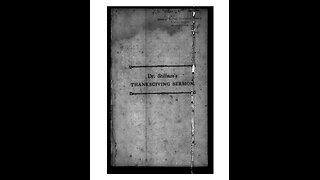 33:25
33:25
PukeOnABook
1 month agoThoughts on the French Revolution. Samuel Stillman 1794 A Puke(TM) Audiobook
58 -
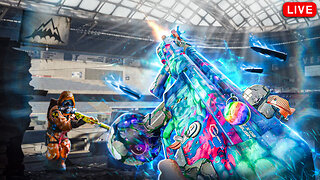 LIVE
LIVE
StoneMountain64
4 hours agoHUNTING FOR THE FIRST WIN BACK ON WARZONE
345 watching -
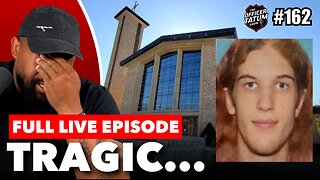
The Officer Tatum
2 hours agoBREAKING: Shooter IDENTIFIED TR*NS , Cracker Barrel CAVES To Pressure + MORE | EP 162
7.96K17 -
 53:47
53:47
Matt Kohrs
2 hours agoLIVE! Nvidia Earnings Call || NVDA Stock Reaction
18K1 -
 LIVE
LIVE
Tudor Dixon
50 minutes agoKarol Markowicz on Freedom, Immigration, and Saving the American Dream | The Tudor Dixon Podcast
88 watching -
 2:03:25
2:03:25
The Quartering
4 hours agoFlag Burning, Free Speech, Church Attack & More With Andrew Wilson
167K266 -
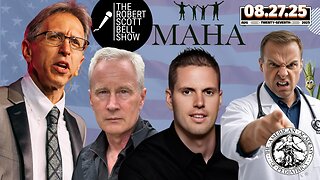 LIVE
LIVE
The Robert Scott Bell Show
18 hours agoDr. Peter McCullough, Vaccines: Mythology, Ideology, and Reality, Dr. Dan Sullivan, Chiropractic - The RSB Show 8-27-25
185 watching -
 1:21:03
1:21:03
Darkhorse Podcast
4 hours agoFreedom, Tyranny, and Childhood Lost: The 291st Evolutionary Lens w/ Bret Weinstein & Heather Heying
19.3K13 -
 LIVE
LIVE
LFA TV
10 hours agoLFA TV ALL DAY STREAM - WEDNESDAY 8/27/25
1,644 watching -
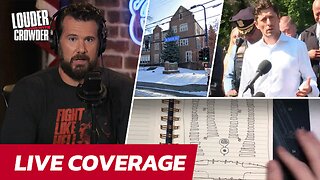 2:34:01
2:34:01
Steven Crowder
4 hours agoBREAKING: Minnesota Catholic School Shooting Update - Shooter & Manifesto
269K386